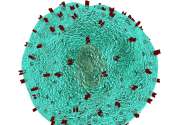Research team identifies a new way to treat prostate cancer
The American Cancer Society estimates there are nearly 300,000 new cases of prostate cancer every year in the U.S., and approximately one in eight men will be diagnosed with prostate cancer in their lifetime. Prostate cancer ...
May 22, 2024
0
5









